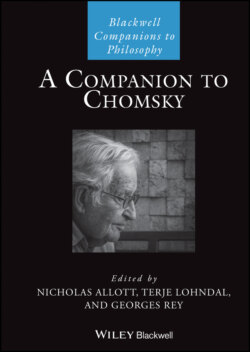Читать книгу A Companion to Chomsky - Группа авторов - Страница 77
7.3.2 Blind Children
ОглавлениеA couple of years later, along came another brilliant person, whose name was Barbara Landau. She wanted to work on language of the blind. I said to her, “Why would you do that?” And she said, “Well, like you looked at the deaf.” And I said, “Yeah, and later we'll do people with a broken arm?”
And she said, “But there's a reason.” Because to some extent they're cut off from the meanings, or at least from the referents. When you say “It's a cloudy day,” they're cut off from the clouds. There's some difference or diminution in your ability to relate the words that you hear to what's going on in the world. And after all, you “must” have learned your language that way – of course, a topic that both Locke (1690) and Hume (1738–1740) had discussed centuries earlier.
So this poor blind child who can't see should be slower in learning and should learn weird things. He should fail to learn some things; we didn't quite know what.
You can predict my first empiricist thought: The child could only learn words for things you could reach out and touch, because touching things has to be their way of getting information. This is what every empiricist should say: You're only going to learn words whose meaning you can get evidence for from the outside world, even though you're blind. So imagine our shock. This changed my whole life. Here's where I fell over the edge. The first verb in this kid's vocabulary was: see! With look not far behind.
And just as advisors to the parents of deaf children had said, “Don't gesture to your child,” clinicians tell the parents of blind children, “Don't use words like look and see to your blind child, because that will lead to empty verbalism.” It's a technical word, verbalism. Why? Because, they say, look and see could have no meaning to the blind.
In fact, when Landau asked the blind child to “look up!”, the child raised her hands as if to explore, keeping her eyes and head immobile. This is in contrast even to blindfolded, sighted three‐year‐olds, who in response to the same command will raise their covered eyes skyward. This was a first demonstration (followed by corroborating evidence) that knowledge of sight‐related concepts is abstract rather than limited to the visual apparatus in particular, and that a blind three‐year‐old has means to discover this (Landau and Gleitman 1985). How could they have learned this? Our answer, as it evolved, turned out to be: They play The Great Verb Game, reverse‐engineering the meaning from the form. That is, it is the appearance of look and see with sentence complements (Let's see if there's cheese in the refrigerator) that informs the learner that look and see are terms of perception, not mere contact (one can't say or understand Let's touch if there's cheese in the refrigerator).
